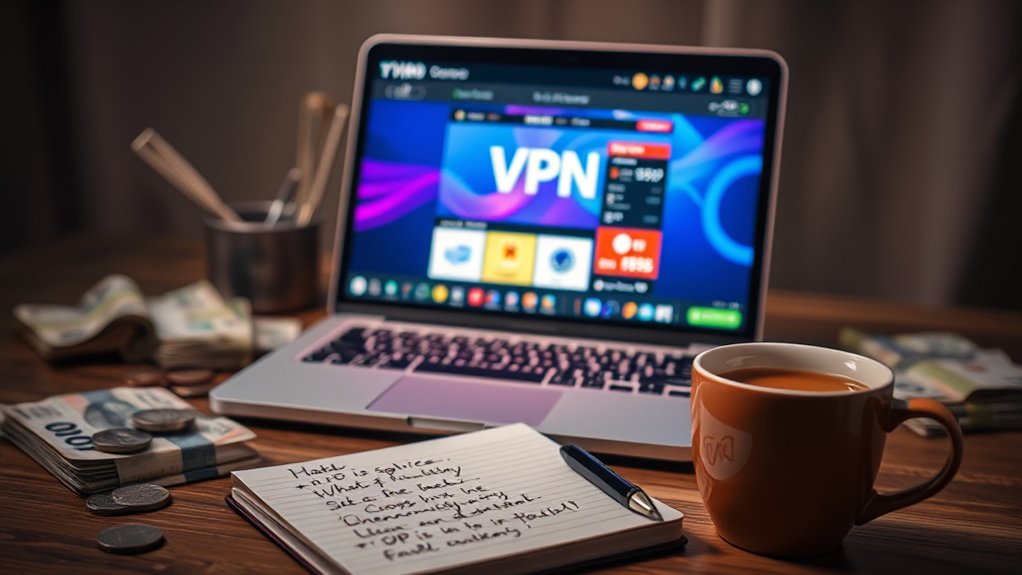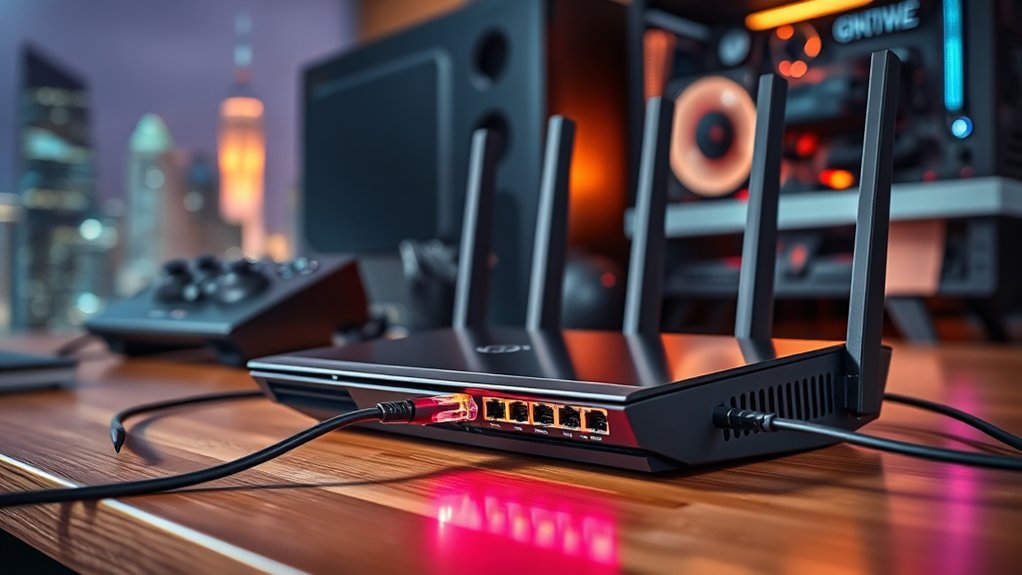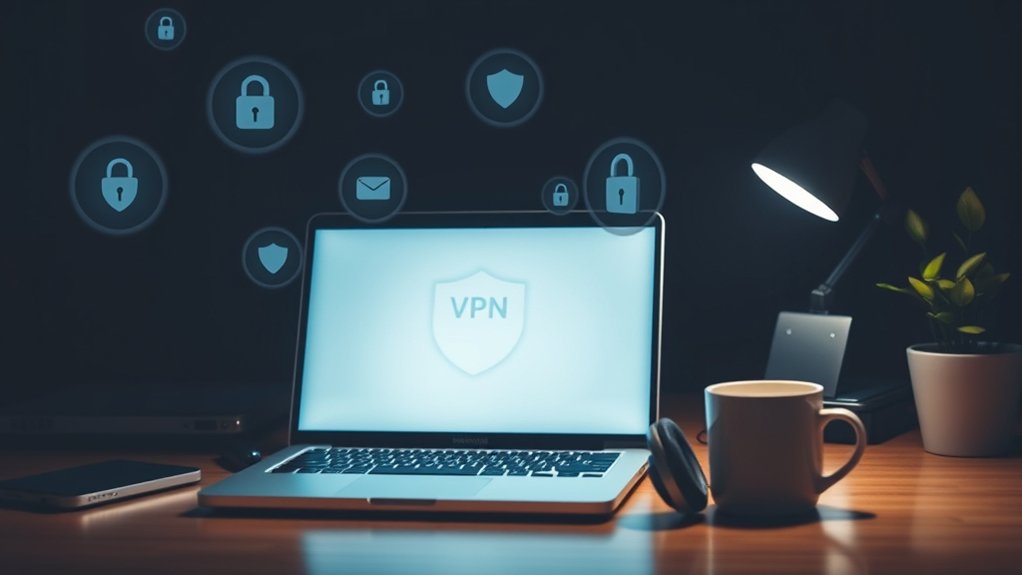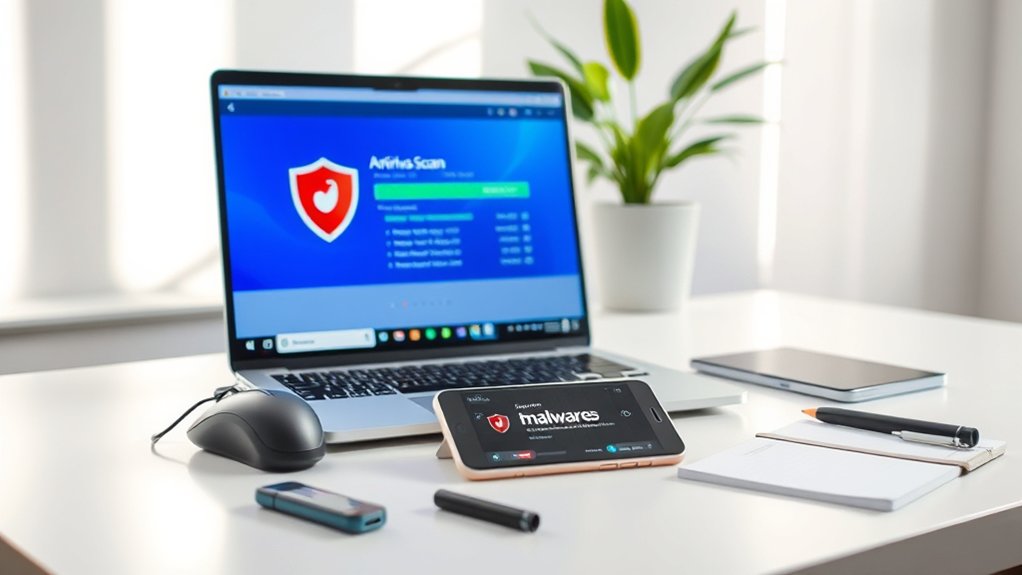VPN costs vary considerably based on subscription length and features. Monthly plans typically range from $9.99 to $12.99, with average expenses around $10. Long-term subscriptions, such as NordVPN’s two-year plan, can reduce monthly fees to as low as $3.09. Cheaper options, like Mullvad at $5.19, offer strong security but may lack certain premium features. Users should assess their specific needs and examine reviews, as the effectiveness of VPNs is not always reflected in their price. Further insights are available for those interested.
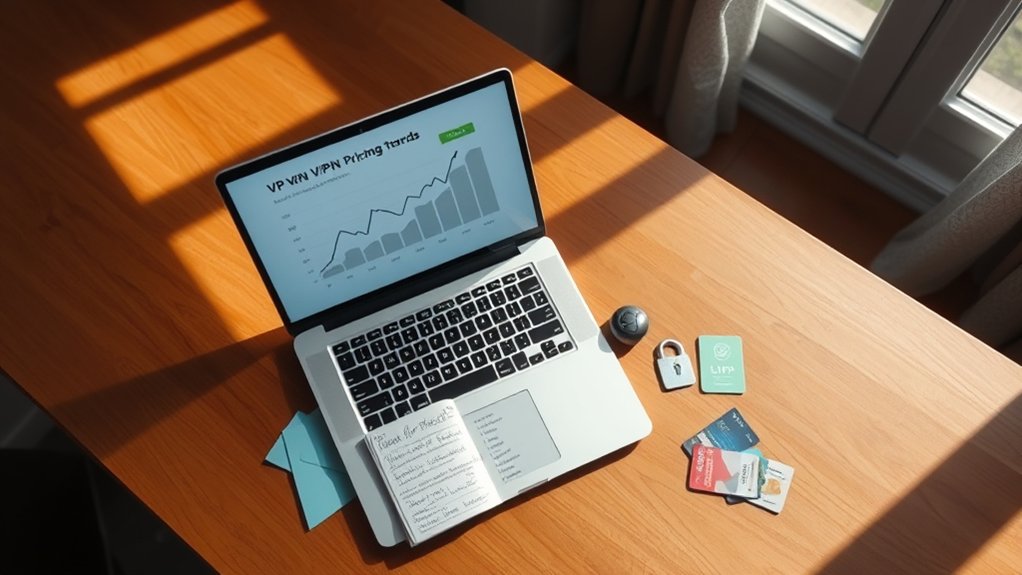
As the demand for online privacy and security continues to rise, the costs associated with Virtual Private Networks (VPNs) have become a focal point for many potential users. VPN pricing varies considerably based on factors such as subscription duration and the features offered. Monthly plans typically range from $9.99 to $12.99, whereas long-term subscriptions often provide substantial savings, albeit requiring upfront payments. Some providers advertise options as low as $2 per month with extended contracts, showcasing a broad spectrum of pricing in the market, with Norton VPN offering one of the most affordable monthly plans at $4.99.
Subscription length plays a vital role in determining VPN costs. Short-term plans typically incur higher fees, offering flexibility for users who prefer not to commit long-term. In contrast, extended plans, especially those lasting two years or more, provide substantial discounts. For example, NordVPN’s two-year plan can drop the monthly cost to as low as $3.09. Moreover, committing to longer subscriptions usually results in lower monthly costs.
Short-term VPN plans offer flexibility but come at higher costs; opting for longer subscriptions can yield significant savings.
Although the average monthly cost for VPNs hovers around $10, it is vital to recognize that price does not directly indicate a VPN’s performance level. Variations in jurisdiction and user reviews considerably influence perceptions of value as well.
Several popular VPN services reflect this pricing diversity. Mullvad VPN is noted for its affordable monthly rate of $5.19, while Bitdefender VPN charges $6.99 per month. Conversely, premium services like NordVPN and ExpressVPN command prices in the range of $12.99 and $12.95, respectively.
Additionally, cheaper alternatives provide strong security features, such as Mullvad, underscoring that lower prices do not necessarily equate to lower quality.
Cost-saving strategies are available for consumers. Opting for longer-term subscriptions, taking advantage of seasonal sales and promotions, or bundling services can yield financial benefits.
In the end, potential users must assess their requirements against the offerings. Evaluating user reviews, available features, and promotional opportunities is crucial for selecting a VPN that balances cost and quality effectively.
Frequently Asked Questions
Can I Use a VPN for Free?
VPN users have access to several free options, such as Proton VPN and Windscribe, which offer various features, including no ads and limited data allowances.
Nonetheless, these services typically impose restrictions on data usage and server selection, whereas some may compromise security or speed.
In spite of these drawbacks, free VPNs serve as a viable option for users seeking basic online privacy.
Nevertheless, they often lack the thorough benefits provided by paid alternatives.
Are There Any Hidden Fees With VPN Subscriptions?
VPN subscriptions often carry hidden fees that consumers should scrutinize. Many providers, such as NordVPN, raise renewal rates considerably after the initial term.
Additional costs may arise from features like dedicated IP addresses, which can add $5-$10 monthly. In addition, tiered pricing structures may limit crucial functionalities except users upgrade plans.
Automatic renewals often occur without notification, potentially leading to unexpected charges, underscoring the importance of careful subscription management and review prior to commitment.
How Do I Choose the Best VPN Provider?
Choosing the best VPN provider requires careful evaluation of several critical factors.
Security features, such as strong encryption protocols and a no-logs policy, are paramount. Furthermore, users should consider the company’s reputation, supported devices, and customer support availability.
A broad server network and performance metrics, such as speed and latency, likewise greatly influence user experience.
Expert recommendations highlight the importance of trial periods to assess suitability before committing to a subscription.
Do VPNS Work on All Devices and Platforms?
VPNs demonstrate broad compatibility across numerous devices and platforms, including Android, iOS, Windows, Linux, and macOS.
Significantly, services such as Proton VPN and NordVPN support streaming on smart TVs and devices like Apple TV and Fire TV Stick.
Many providers offer simultaneous connections, allowing multiple devices to securely browse simultaneously.
Industry standards, such as AES-256 encryption, guarantee strong security.
As a result, users can enjoy seamless protection across diverse digital environments without significant limitations.
Can a VPN Improve Internet Speed?
A Virtual Private Network (VPN) can improve internet speed under certain conditions, particularly by mitigating ISP throttling. For example, streaming large files may show speed improvements if an ISP limits those activities.
Nevertheless, the overall effectiveness depends on specific user circumstances, such as the distance to the VPN server and the current server load.
High-quality VPNs often employ advanced technology, minimizing speed reductions and ensuring a more equitable online experience for users.
